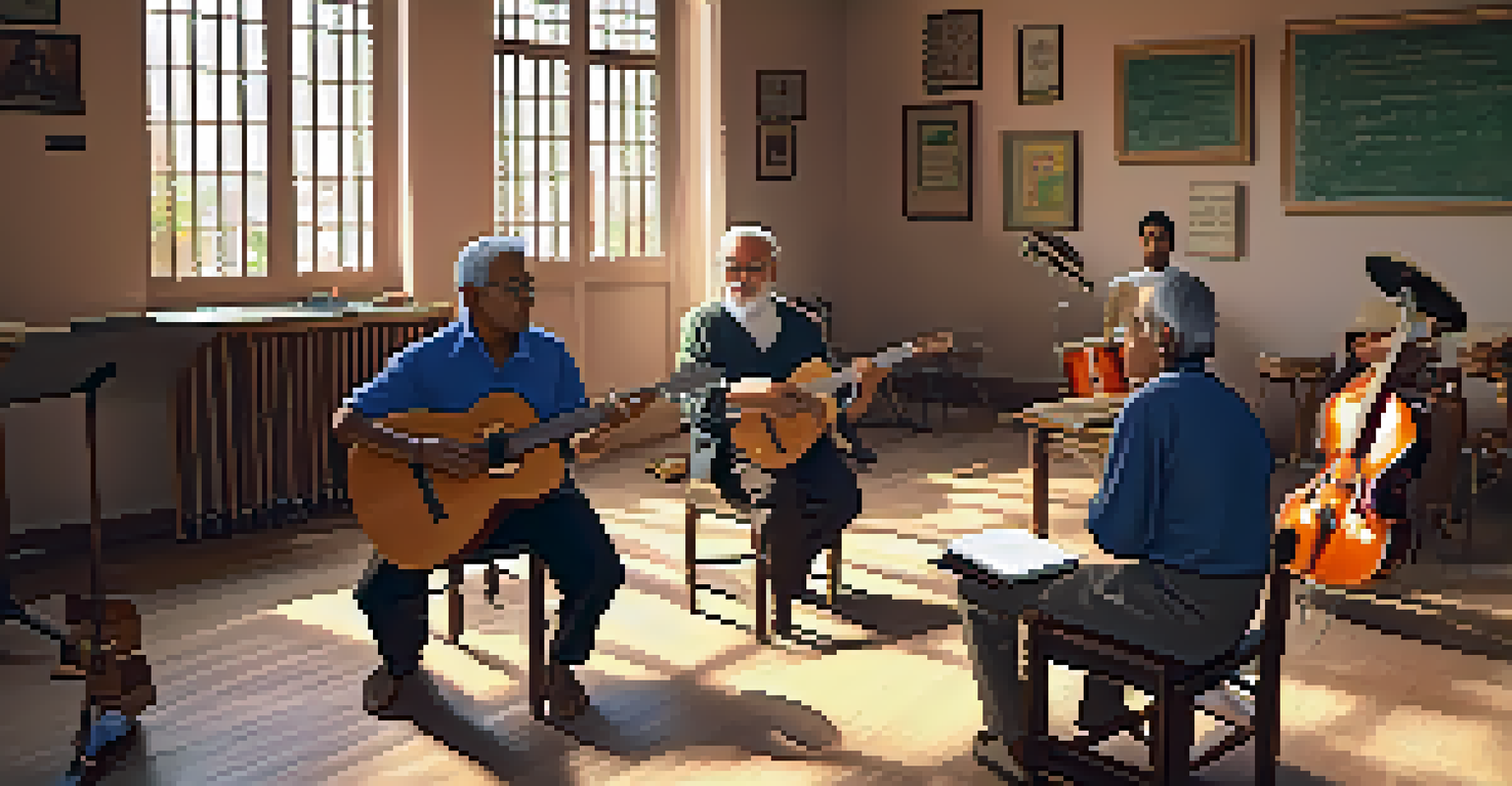The Influence of Culture on Music Theory and Practices

Understanding Music Theory: A Cultural Lens
Music theory often serves as a framework for analyzing the structures and systems within music. However, this framework is deeply influenced by the cultural contexts in which it develops. Different cultures prioritize various aspects of music, such as rhythm, melody, or harmony, which can lead to unique theoretical approaches.
Music is the universal language of mankind.
For example, Western music theory largely revolves around the diatonic scale and harmonic progression, emphasizing tonality. In contrast, Indian classical music employs a system of ragas that focuses on mood and emotion, showcasing a different theoretical perspective. This illustrates how cultural values shape the way music is understood and taught.
By examining music theory through a cultural lens, we can appreciate the diversity of musical expressions and the rich tapestry of human creativity. Understanding these differences opens up a world of possibilities for musicians, composers, and listeners alike.
Cultural Influences on Musical Genres
Musical genres are often a reflection of the cultural zeitgeist in which they arise. Genres like jazz, blues, and rock 'n' roll emerged from specific historical and social contexts, each with roots in the cultures that birthed them. For instance, jazz is a product of African American communities and incorporates elements of improvisation and call-and-response, rooted in African musical traditions.

Similarly, folk music from various regions tells the stories of local communities, often using indigenous instruments and scales. These elements not only define the sound of a genre but also convey cultural narratives and values. This connection highlights how music serves as a vehicle for cultural expression and identity.
Cultural Context Shapes Music Theory
Different cultures influence music theory by prioritizing elements like rhythm, melody, or harmony, leading to diverse theoretical approaches.
As musicians explore and blend genres, they continue to reflect their cultural backgrounds, creating new sounds that resonate with diverse audiences. This ongoing evolution demonstrates that culture is not static; it continually shapes and reshapes the music we know and love.
The Role of Language in Music Creation
Language plays a significant role in shaping musical practices and theory. The words we use can influence how music is composed, performed, and understood. For example, in cultures where storytelling is paramount, lyrics often take center stage, guiding the emotional landscape of a song.
Without music, life would be a mistake.
In contrast, instrumental music may dominate in cultures that prioritize melodic development over lyrical content. The language of music itself—its notations and terminologies—varies across cultures, further emphasizing how language intertwines with musical expression.
This interplay between language and music highlights the importance of context in understanding musical practices. By recognizing the linguistic roots of music, we can gain deeper insights into the cultural significance of various musical forms.
Cultural Traditions and Musical Training
Musical training is often steeped in cultural traditions, influencing how musicians learn and develop their craft. In many cultures, music education occurs informally through oral traditions, where skills are passed down through generations. This hands-on approach fosters a deep connection between the learner and their cultural heritage.
In contrast, Western classical music typically involves formal education, where students study music theory, notation, and performance techniques in structured settings. While both methods produce skilled musicians, they do so through different cultural lenses, shaping their musical identities.
Music Reflects Cultural Narratives
Genres such as jazz and folk music emerge from specific cultural contexts, using sound to convey stories and values of their communities.
Understanding these diverse training methods can enrich our appreciation of music from around the world. It also encourages musicians to explore various educational approaches, opening doors to new styles and techniques.
The Impact of Technology on Cultural Music Practices
Technology has dramatically transformed how music is created, shared, and experienced, influencing cultural music practices in profound ways. The advent of recording technology, for instance, has allowed for the preservation of traditional music forms that might otherwise be lost. This preservation plays a crucial role in maintaining cultural identity.
Moreover, digital platforms enable musicians from different cultures to collaborate and share their work globally. This accessibility fosters cross-cultural exchanges, leading to innovative fusions of musical styles that reflect a blend of traditions. For example, electronic dance music often incorporates elements from various cultural backgrounds, creating a rich tapestry of sound.
As technology continues to evolve, its impact on music will only grow, further intertwining cultural and musical practices. Embracing these changes can lead to exciting developments in how we create and appreciate music.
Globalization and the Evolution of Music
Globalization has played a pivotal role in reshaping music practices worldwide. As cultures collide and intermingle, new musical forms emerge, often blending elements from different traditions. This fusion can be seen in genres like reggaeton, which combines Latin rhythms with Caribbean influences, creating a vibrant sound that resonates globally.
While globalization fosters creativity and collaboration, it also raises questions about cultural appropriation. Musicians must navigate the fine line between drawing inspiration from other cultures and respecting their origins. Understanding the cultural significance behind musical elements is crucial to ensuring authenticity in these new forms.
Technology Preserves Cultural Music
Advancements in technology enable the preservation of traditional music forms and foster global collaboration, enriching the musical landscape.
Ultimately, globalization challenges us to rethink our definitions of culture and music. The result is a dynamic landscape where music continues to evolve, reflecting the complexities of our interconnected world.
The Future of Music: Cultural Sustainability
As we look to the future, the sustainability of cultural music practices becomes paramount. With the rapid pace of change in the music industry, there’s a growing concern about preserving traditional forms that are at risk of fading away. Initiatives aimed at revitalizing and promoting indigenous music can help ensure that these cultural expressions survive for future generations.
Technology can play a significant role in this effort, as platforms that support local musicians can help preserve and promote traditional music. By providing resources and visibility, we can encourage the continuation of cultural practices and foster a sense of pride within communities.

Ultimately, the future of music lies in our ability to balance innovation with cultural preservation. As we celebrate the rich diversity of musical traditions, we must also commit to supporting and sustaining the cultures that give rise to them.